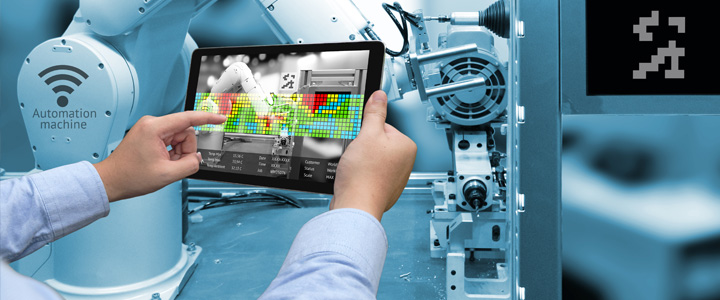
Not That Different From Managing People
In less than two years, Changying Precision Technology Company replaced 90% of its employees with robots. Production soared by 250% and defects dropped by 80%. How can we all learn from this new model of manufacturing?
As manufacturers face new and increasing challenges, businesses in the industry must be more flexible now than ever before. Challenges like decreased times to market, reduced consumer transparencies, and shorter product lifecycles place previously unknown pressures on manufacturing businesses. To survive and succeed, manufacturers must be able to rapidly adapt and innovate to the constantly changing demands they face.
The constant need for adaptation requires innovation, yet this isn’t something that many manufacturers do well. One survey found that only 20% of CEOs were pleased with their company’s return on innovation, which means 80% are both not seeing the returns they want and struggling to adapt when circumstances change.
There is hope for manufacturers, however. Artificial intelligence and robotic machines can give manufacturers the capability and flexibility they need, so long as executive teams understand how to implement these technologies in effective ways. Executives who find creative ways to overcome the aforementioned challenges will be the ones who successfully lead their manufacturing businesses not just through today’s production-related troubles but tomorrow’s as well.
Robots That Communicate With Each Other
Robots that work in isolation are no longer adequate for manufacturing facilities that have multi-step processes. When an individual robot works alone, routine operations don’t run as efficiently as they could and serious slowdowns occur when there’s even a minor hiccup in production.
Instead, manufacturers need robotic machines that can communicate with each other much like employees talk to one another. Both machines and robots need some capacity for conversation by which they can coordinate production across an entire facility and make adjustments as necessary. Without such communication, manufacturing facilities simply can’t compete in the industrial revolution 4.0.
Robots That Perform Multiple Tasks
Robots that are limited to just one function generally also aren’t adequate for modern manufacturing facilities. Although a machine that performs a single, highly specialized function is necessary in select situations, the majority of robots that manufacturers use have to complete multiple functions and/or be adaptable so they continue to be useful when projects change.
Again, a personnel parallel is readily evident. Highly skilled workers are needed at times, but businesses invest a tremendous amount of resources in helping employees gain new skills because a diversely skilled employee is of more value to a business.
In a manufacturing world that’s characterized by short lifecycles and quickly changing demands, machines and employees with complementary abilities are the ones that give manufacturers the flexibility they need to regularly adapt.
Reports of robotic machine sales may suggest that many companies are already realizing how much they need multifunction robotic machines. In 2017, the number of industrial robots sold rose by 19.2% — but revenue from industrial robot sales increased by only 0.6%.
The discrepancy between the number of units sold and the revenue generated from those sales can largely be attributed to the types of robots that companies are ordering. Instead of buying large, expensive robots that do a single function, companies are opting for additional smaller robots that work collaboratively on multiple tasks.
Software That Manages All Machinery
In order to effectively manage multiple interconnected robotic machines that perform varied tasks, manufacturing facilities need a software program that orchestrates operations throughout a facility. An artificial intelligence program that doesn’t just run one machine but oversees the performance of all machines can make efficiency adjustments whenever necessary.
This isn’t all that different from what a facility manager or C-level executive of a single-location manufacturing business might do. While managers oversee the people who work at their plant, an artificial intelligence program can manage the machines that work alongside human employees.
Interconnected Facilities That Span a Global Production Line
For manufacturing businesses with global production lines or multi-site operations, the software program in any one facility can’t stand on its own but has to be connected with the programs at all other facilities. All facilities’ artificial intelligence programs must be in constant communication with each other to ensure operations run smoothly across the entire production line.
While a never-ending conference call might sound like an executive’s nightmare, many executives would welcome artificial intelligence that constantly monitored processes across all of their businesses’ sites.
Finding Executives Who Recognize the Future of Manufacturing
Artificial intelligence is clearly the path forward for manufacturing businesses that hope to compete in the future. The biggest step forward may not be in the innovation of artificial intelligence and robotic machines themselves, though, but rather how these technologies are used within the manufacturing and industrial industry.
Realizing how to implement artificial intelligence and robotic machines within a manufacturer’s existing structure requires foresight, creativity, and vision, and it’s a select group of executives who have the insight to incorporate these technologies at an aggregate level. Stanton Chase has specialized in global identification of this C-level skill set and is positioned to help your business attract professionals who are capable of leading companies through these changes and into the future of manufacturing.
How Can We Help?
At Stanton Chase, we're more than just an executive search and leadership consulting firm. We're your partner in leadership.
Our approach is different. We believe in customized, personal, and fearless executive search, executive assessment, board services, succession planning, and leadership onboarding support.
We believe in your potential to achieve greatness and we'll do everything we can to help you get there.
View All Services